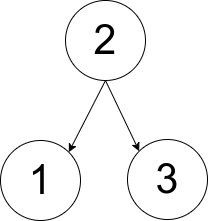LeetCode-in-Java
1719. Number Of Ways To Reconstruct A Tree
Hard
You are given an array pairs, where pairs[i] = [xi, yi], and:
- There are no duplicates.
xi < yi
Let ways be the number of rooted trees that satisfy the following conditions:
- The tree consists of nodes whose values appeared in
pairs. - A pair
[xi, yi]exists inpairsif and only ifxiis an ancestor ofyioryiis an ancestor ofxi. - Note: the tree does not have to be a binary tree.
Two ways are considered to be different if there is at least one node that has different parents in both ways.
Return:
0ifways == 01ifways == 12ifways > 1
A rooted tree is a tree that has a single root node, and all edges are oriented to be outgoing from the root.
An ancestor of a node is any node on the path from the root to that node (excluding the node itself). The root has no ancestors.
Example 1:

Input: pairs = [[1,2],[2,3]]
Output: 1
Explanation: There is exactly one valid rooted tree, which is shown in the above figure.
Example 2:

Input: pairs = [[1,2],[2,3],[1,3]]
Output: 2
Explanation: There are multiple valid rooted trees. Three of them are shown in the above figures.
Example 3:
Input: pairs = [[1,2],[2,3],[2,4],[1,5]]
Output: 0
Explanation: There are no valid rooted trees.
Constraints:
1 <= pairs.length <= 1051 <= xi < yi <= 500- The elements in
pairsare unique.
Solution
import java.util.HashSet;
@SuppressWarnings("java:S1119")
public class Solution {
public int checkWays(int[][] pairs) {
int[][] adj = new int[501][501];
HashSet<Integer> set = new HashSet<>();
for (int[] pair : pairs) {
adj[pair[0]][pair[1]]++;
adj[pair[1]][pair[0]]++;
set.add(pair[0]);
set.add(pair[1]);
}
int n = set.size();
int[] num = new int[501];
for (int i = 0; i < 501; i++) {
for (int j = 0; j < 501; j++) {
num[i] += adj[i][j];
}
}
int c = 0;
for (int i = 0; i < 501; i++) {
if (num[i] == n - 1) {
c++;
}
}
for (int j = 0; j < 501; j++) {
if (num[j] == n - 1) {
num[j] = 0;
for (int k = 0; k < 501; k++) {
if (adj[j][k] > 0) {
adj[j][k] = 0;
adj[k][j] = 0;
num[k]--;
}
}
set.remove(j);
break;
}
if (j == 500) {
return 0;
}
}
int res = search(adj, num, set);
if (res == 1 && c > 1) {
return 2;
}
return res;
}
private int search(int[][] adj, int[] num, HashSet<Integer> vals) {
if (vals.isEmpty()) {
return 1;
}
int max = 0;
for (int i : vals) {
if (num[i] > num[max]) {
max = i;
}
}
int size = num[max];
if (size == 0) {
return 1;
}
boolean c = false;
i:
for (int i : vals) {
if (num[i] == num[max]) {
for (int j : vals) {
if (j != i && num[j] == num[i] && adj[i][j] > 0) {
c = true;
break i;
}
}
}
}
HashSet<Integer> set = new HashSet<>();
for (int j = 0; j < 501; j++) {
if (adj[max][j] > 0 && !vals.contains(j)) {
return 0;
}
if (adj[max][j] > 0) {
adj[max][j] = 0;
adj[j][max] = 0;
num[j]--;
set.add(j);
}
}
num[max] = 0;
HashSet<Integer> set2 = new HashSet<>();
for (int i : vals) {
if (!set.contains(i) && i != max) {
set2.add(i);
}
}
int res1 = search(adj, num, set);
int res2 = search(adj, num, set2);
if (res1 == 0 || res2 == 0) {
return 0;
}
if (res1 == 2 || res2 == 2 || c) {
return 2;
}
return 1;
}
}

